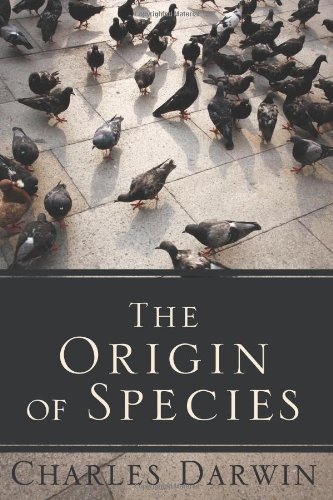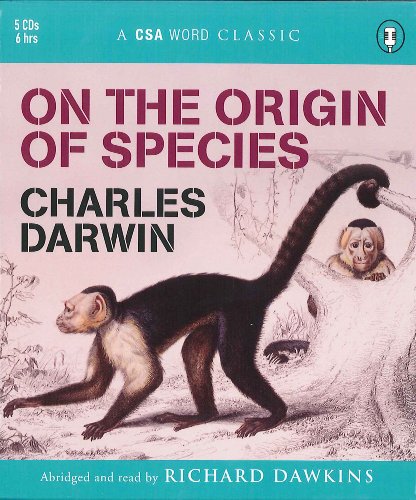-
The Origin of Species
Charles Darwin
Paperback (CreateSpace Independent Publishing Platform, Feb. 15, 2010)The sixth edition (1872) of the formative text of evolutionary biology. Darwin's book introduced the then-radical theory that populations evolve over the course of generations through a process of natural selection. Its original full title was On the Origin of Species by Means of Natural Selection, or the Preservation of Favoured Races in the Struggle for Life.
-
On The Origin of Species
Charles Darwin, Richard Dawkins
Audio CD (CSA Word, Aug. 1, 2008)On the Origin of the Species ranks as one of the most important and influential books ever written, and one that remains as controversial today as upon its initial publication 150 years ago. Here, eminent biologist and staunch Darwinist Richard Dawkins narrates his own expertly abridged version of Darwin's groundbreaking book. In cutting passages that are now proven to be wrong, mostly those dealing with genetics, Dawkins streamlines the book for modern tastes while preserving its sound scientific underpinnings. What's truly remarkable, Dawkins notes, is how much Darwin got right. Remarkable, too, is the clarity of Darwin's prose, which, while necessarily technical in nature, makes the scientific basis for his theory of natural selection accessible to laypeople. For those wavering between creationism and evolution, or for anyone who wants a better understanding of Darwinism, Dawkins' brilliant reading is the perfect entry into a book that truly changed the world.
-
The Origin of Species
Charles Darwin
eBook (Aegitas, Jan. 5, 2017)On the Origin of Species (or more completely, On the Origin of Species by Means of Natural Selection, or the Preservation of Favoured Races in the Struggle for Life), published on 24 November 1859, is a work of scientific literature by Charles Darwin which is considered to be the foundation of evolutionary biology. Darwin's book introduced the scientific theory that populations evolve over the course of generations through a process of natural selection. It presented a body of evidence that the diversity of life arose by common descent through a branching pattern of evolution. Darwin included evidence that he had gathered on the Beagle expedition in the 1830s and his subsequent findings from research, correspondence, and experimentation.
-
The Origin of Species
Charles Darwin
eBook (, July 28, 2019)On the Origin of Species (or, more completely, On the Origin of Species by Means of Natural Selection, or the Preservation of Favoured Races in the Struggle for Life),[3] published on 24 November 1859, is a work of scientific literature by Charles Darwin which is considered to be the foundation of evolutionary biology.[4] Darwin's book introduced the scientific theory that populations evolve over the course of generations through a process of natural selection. It presented a body of evidence that the diversity of life arose by common descent through a branching pattern of evolution. Darwin included evidence that he had gathered on the Beagle expedition in the 1830s and his subsequent findings from research, correspondence, and experimentation.[5]Various evolutionary ideas had already been proposed to explain new findings in biology. There was growing support for such ideas among dissident anatomists and the general public, but during the first half of the 19th century the English scientific establishment was closely tied to the Church of England, while science was part of natural theology. Ideas about the transmutation of species were controversial as they conflicted with the beliefs that species were unchanging parts of a designed hierarchy and that humans were unique, unrelated to other animals. The political and theological implications were intensely debated, but transmutation was not accepted by the scientific mainstream.The book was written for non-specialist readers and attracted widespread interest upon its publication. As Darwin was an eminent scientist, his findings were taken seriously and the evidence he presented generated scientific, philosophical, and religious discussion. The debate over the book contributed to the campaign by T. H. Huxley and his fellow members of the X Club to secularise science by promoting scientific naturalism. Within two decades there was widespread scientific agreement that evolution, with a branching pattern of common descent, had occurred, but scientists were slow to give natural selection the significance that Darwin thought appropriate. During "the eclipse of Darwinism" from the 1880s to the 1930s, various other mechanisms of evolution were given more credit. With the development of the modern evolutionary synthesis in the 1930s and 1940s, Darwin's concept of evolutionary adaptation through natural selection became central to modern evolutionary theory, and it has now become the unifying concept of the life sciences.
-
The Origin of Species
Charles Darwin, Julian Huxley
Mass Market Paperback (Signet, Aug. 21, 1986)One of the most controversial books ever written... The classic that changed the way we look at the world-- and ourselves.In the words of Ashley Montagu, "Next to the Bible no work has been quite as influential, in virtually every aspect of human thought, as The Origin of Species."With an introduction by Sir Julian Huxley, this edition reminds us why Darwin's work exploded into public controversy and revolutionized the course of science--and continues to transform our views of the world as a new millennium dawns."Next to the Bible no work has beenquite as influential."--Ashley Montagu* Includes an introduction by Sir Julian Huxley
-
The Origin Of Species
Charles Darwin, A to Z Classics
eBook (ATOZ Classics, April 21, 2018)Charles Darwin's On the Origin of Species, in which he writes of his theories of evolution by natural selection, is one of the most important works of scientific study ever published.
-
The Origin of Species
Charles Darwin
eBook (G Books, March 17, 2020)The publication of Darwin’s The Origin of Species in 1859 marked a dramatic turning point in scientific thought. The volume had taken Darwin more than twenty years to publish, in part because he envisioned the storm of controversy it was certain to unleash. Indeed, selling out its first edition on its first day, The Origin of Species revolutionized science, philosophy, and theology.Darwin’s reasoned, documented arguments carefully advance his theory of natural selection and his assertion that species were not created all at once by a divine hand but started with a few simple forms that mutated and adapted over time. Whether commenting on his own poor health, discussing his experiments to test instinct in bees, or relating a conversation about a South American burrowing rodent, Darwin’s monumental achievement is surprisingly personal and delightfully readable. Its profound ideas remain controversial even today, making it the most influential book in the natural sciences ever written—an important work not just to its time but to the history of humankind.
-
On the Origin of Species
Charles Darwin
Audio CD (Naxos AudioBooks, July 8, 2016)Perhaps the most influential science book ever written, On the Origin of Species has continued to fascinate readers for more than a century after its initial publication. Its controversial theory that populations evolve and adapt through a process known as natural selection led to heated scientific, philosophical and religious debate, revolutionizing every discipline in its wake. With its clear, concise and surprisingly enjoyable prose, On the Origin of Species is both captivating and edifying.
-
The Origin of Species
Charles Darwin
Paperback (CreateSpace Independent Publishing Platform, Feb. 9, 2018)In his famous work, Charles Darwin presents the theory that populations evolve over the course of generations through the process of natural selection.
-
The Origin of Species
Charles Darwin
eBook (G Books, Jan. 11, 2020)Darwin's theory of natural selection issued a profound challenge to orthodox thought and belief: no being or species has been specifically created; all are locked into a pitiless struggle for existence, with extinction looming for those not fitted for the task.Yet The Origin of Species (1859) is also a humane and inspirational vision of ecological interrelatedness, revealing the complex mutual interdependencies between animal and plant life, climate and physical environment, and—by implication—within the human world.Written for the general reader, in a style which combines the rigour of science with the subtlety of literature, The Origin of Species remains one of the founding documents of the modern age.
-
The Origin Of Species
Charles Darwin, Jamie Iaconis
eBook (G Books, Nov. 4, 2013)Charles Darwin’s Origin of Species (publ. 1859) is a pivotal work in scientific literature and arguably the pivotal work in evolutionary biology. The book’s full title is On the Origin of Species by Means of Natural Selection, or the Preservation of Favoured Races in the Struggle for Life. It introduced the theory that populations evolve over the course of generations through a process of natural selection. It was controversial because it contradicted religious beliefs which underlay the then current theories of biology. Darwin’s book was the culmination of evidence he had accumulated on the voyage of the Beagle in the 1830s and added to through continuing investigations and experiments since his return.
-
The Origin of Species
Charles Darwin
eBook (G Books, Dec. 7, 2019)On the Origin of Species (or, more completely, On the Origin of Species by Means of Natural Selection, or the Preservation of Favoured Races in the Struggle for Life),[3] published on 24 November 1859, is a work of scientific literature by Charles Darwin which is considered to be the foundation of evolutionary biology.[4] Darwin's book introduced the scientific theory that populations evolve over the course of generations through a process of natural selection. It presented a body of evidence that the diversity of life arose by common descent through a branching pattern of evolution. Darwin included evidence that he had gathered on the Beagle expedition in the 1830s and his subsequent findings from research, correspondence, and experimentation.Various evolutionary ideas had already been proposed to explain new findings in biology. There was growing support for such ideas among dissident anatomists and the general public, but during the first half of the 19th century the English scientific establishment was closely tied to the Church of England, while science was part of natural theology. Ideas about the transmutation of species were controversial as they conflicted with the beliefs that species were unchanging parts of a designed hierarchy and that humans were unique, unrelated to other animals. The political and theological implications were intensely debated, but transmutation was not accepted by the scientific mainstream.The book was written for non-specialist readers and attracted widespread interest upon its publication. As Darwin was an eminent scientist, his findings were taken seriously and the evidence he presented generated scientific, philosophical, and religious discussion. The debate over the book contributed to the campaign by T. H. Huxley and his fellow members of the X Club to secularise science by promoting scientific naturalism. Within two decades there was widespread scientific agreement that evolution, with a branching pattern of common descent, had occurred, but scientists were slow to give natural selection the significance that Darwin thought appropriate. During "the eclipse of Darwinism" from the 1880s to the 1930s, various other mechanisms of evolution were given more credit. With the development of the modern evolutionary synthesis in the 1930s and 1940s, Darwin's concept of evolutionary adaptation through natural selection became central to modern evolutionary theory, and it has now become the unifying concept of the life sciences.